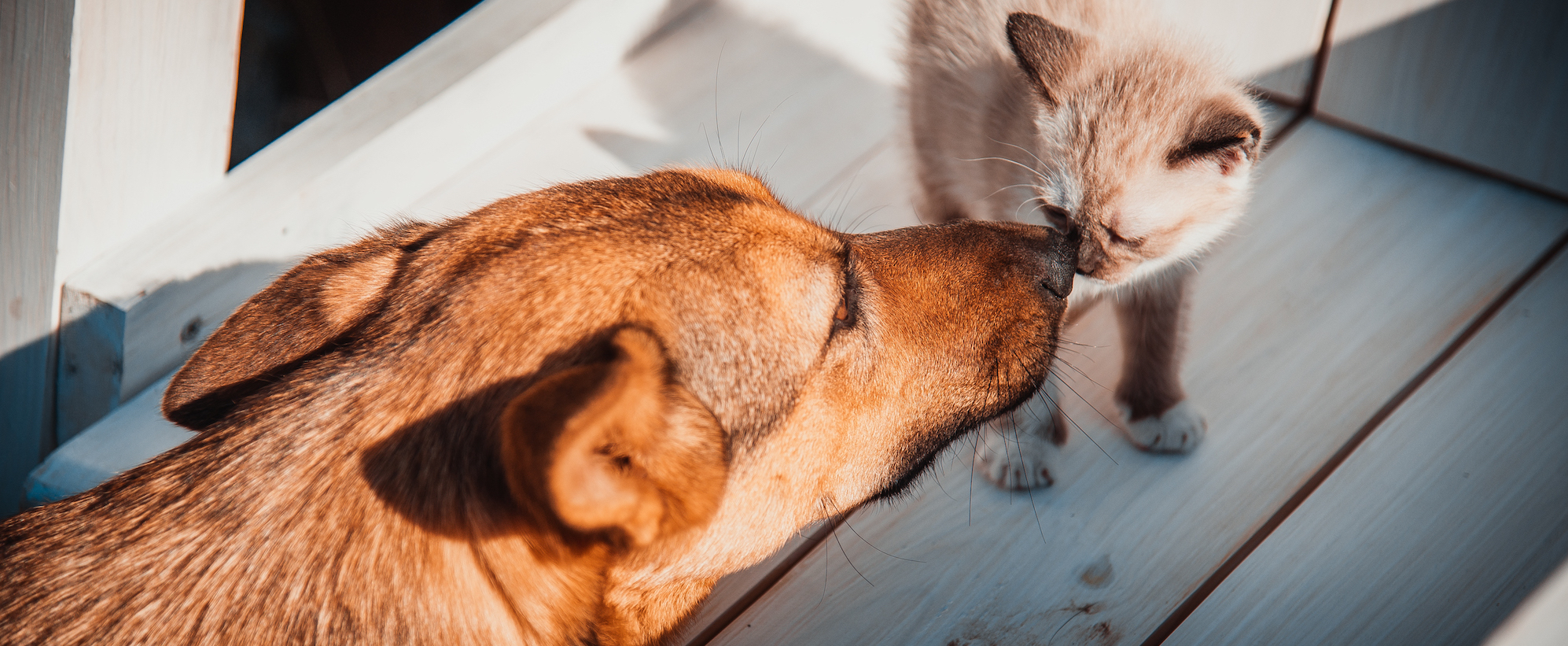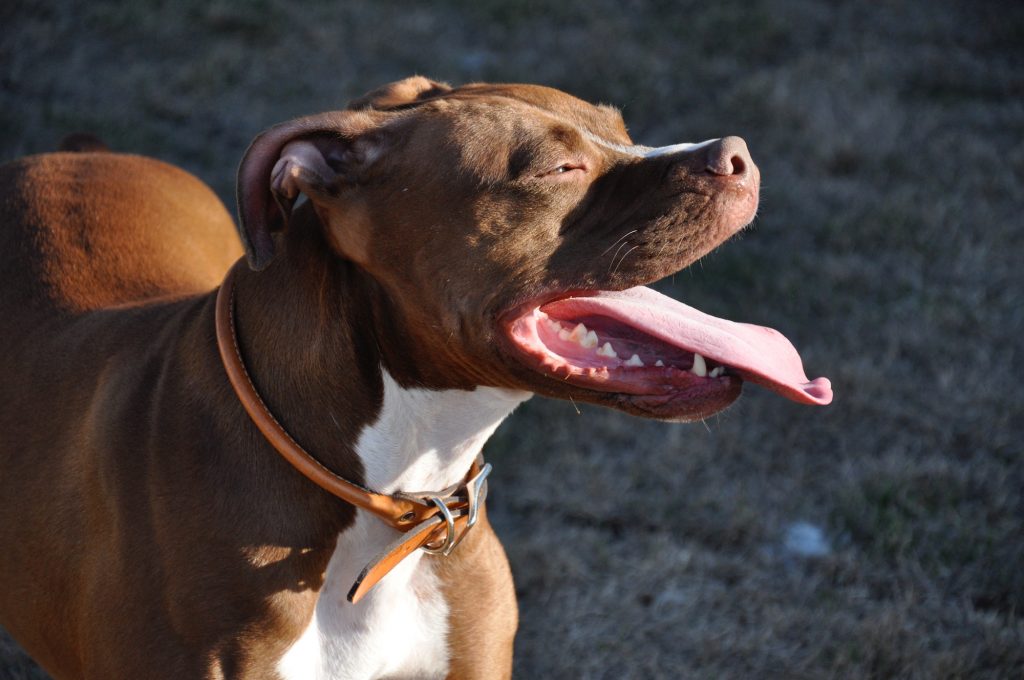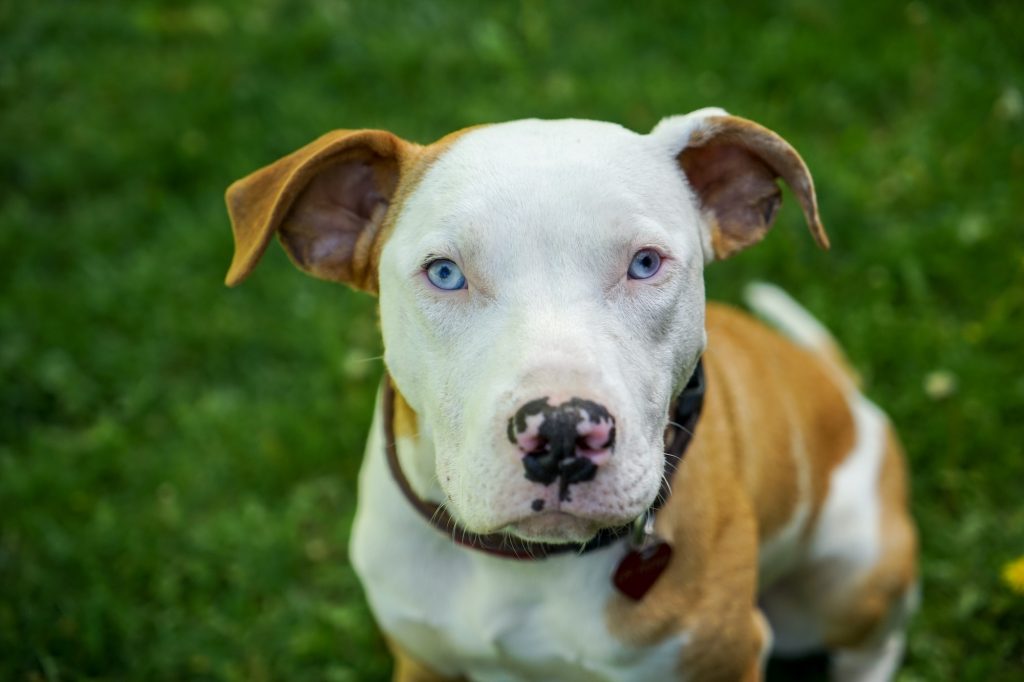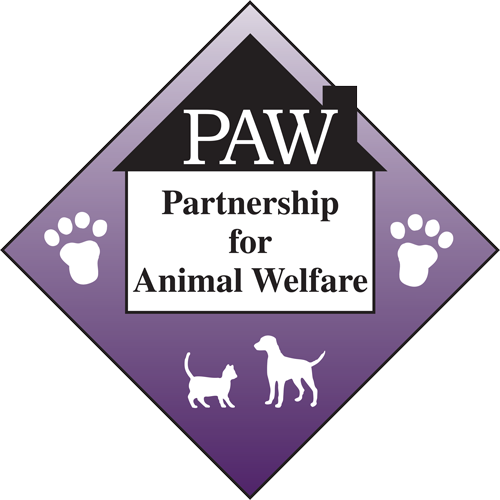
Pit Bull Corner
What’s a Pit Bull?
Breeds commonly referred to as “pit bulls” include American Pit Bull Terriers (APBT), American Staffordshire Terriers (AST), Staffordshire Bull Terriers and mixes that include one of these breeds.
Pit Bulls typically possess the terrier mentality; they’re high achievers! These strong, energetic canines engage in activities with single-minded dedication. They have the genetic potential to be aggressive to other animals, so it’s essential to supervise your dog and be the leader of your pack.
The Pit Bull Personality
Pit Bulls love to be with their people, play fetch, cuddle…and they have a great sense of humor. They do well in urban living provided they have enough exercise and other positive outlets for their energy. It’s no surprise why Pit Bull owners find so much joy in being with their dogs and consider them “pet bulls.”
Pit Bulls are very strong, agile dogs. “Determination” is a defining trait of terriers. Whatever they set out to do, they put their heart into it…whether escaping a fenced yard to chase a cat, or digging into your couch for buried treasure when left home alone, or playing fetch, or climbing into your lap and licking every inch of your face.

The Difference between Animal-Aggression and People-Aggression
Aggression to humans is a completely separate trait from aggression towards other dogs. Unless very poorly bred or trained to attack humans through abusive methods, Pit Bulls are by nature very good with people. A dog showing severe shyness or aggression towards humans may be genetically unstable.
The Truth about Pit Bulls
Pit Bulls are not the stereotypical devil dog put forth in media myths. They are companion animals who have enhanced the lives of many through their devoted people-loving natures, positively channeled physical prowess, bravery, and intelligence. Pit Bulls have served key roles in search-and-rescue efforts, excel in agility training, and work nationwide as therapy and service dogs. Famous Pit Bulls include Petey in “Our Gang/Little Rascals” film series and an American poster mascot during WWI.
Pit Bulls strive to take on the behaviors that their guardians instill in them, and their behavior is reflective of the care, training and socialization practices (or lack thereof) used by their owners.
Most Pit Bulls are very good with children. However, any dog must be supervised with children at all times. Like other active dogs, they need substantial daily exercise — and depend on their owners to teach them good manners, such as not jumping. PAW does not recommend young, active dogs for families with young children. Mature dogs past four years of age are usually better for households with children.
Owner responsibility is required for anyone getting any dog. It is essential for owners to socialize and train their dogs so they are well-behaved with people of all ages and in public situations.
We are working to find caring, committed homes for companion animals, including Pit Bulls, and to educate people. Myths do harm to everyone. Knowing the truth helps us to manage our dogs and avoid problems.
Knowledge is Vital
Pit Bulls make wonderful, loving and very loyal companions for owners who do their homework and learn how to establish leadership using humane, positive techniques.
Before getting any dog, one should research thoroughly. Understanding breed characteristics and background are necessary for being a responsible owner.
Pit Bulls and Other Animals
Success in a multi-pet household depends on the individual animal, training and socialization, and constant supervision by the owner.
Many Pit Bulls interact well with many other dogs and sometimes other pets; so much depends on the individual dog’s temperament, training and early and ongoing socialization. However, owners must be aware that the trait of aggression towards dogs and other animals (not towards humans) was bred in, and cannot be reliably trained away. Love cannot change the genetic make-up of your dog.
Many dogs were bred with a specific purpose; herding breeds tend to display nipping behaviors and scent-hounds follow their noses. Pit Bulls were originally bred for work that included bull-baiting and dog fighting. It is not the “hate” of other dogs that drives some to fight, but an “urge” that has been bred into them.
Your dog may not feel compelled to fight with other animals, but carelessness can possibly lead to a sudden, serious fight. Even two dogs who have been friends for years may fight if something triggers an instinct. With any breed, a calm pup could show animal aggression in the future; a dog may not mature and show his true temperament until age three.
In addition, most terriers have a strong prey drive, and often regard cats, rabbits and squirrels as targets. It definitely helps to socialize dogs from the start with many types of animals and find positive outlets for their energy drive. Early and ongoing obedience training is essential as well. A dog who has been raised properly, socialized and trained will be easier to handle.
Benevolent leadership typically results in a dog who respects and obeys you. At the same time, you must always supervise your dog, and keep the environment free of things such as rawhide toys that can trigger a fight between dogs.
It is also important to channel your dog’s energy through exercise every day and to keep them mentally stimulated.
Being Aware and Prepared
With any breed, owners need to be aware of unique behavioral, physical and mental characteristics. All dogs need responsible, active and caring owners. Pit Bulls are strong and energetic, so we recommend that owners take them to obedience classes as soon as they are up to date on shots.
Pit Bulls suffer from prejudice and misunderstanding, so ownership requires a willingness to consider your neighbors’ concerns and educate them. Never leave your dog alone in a yard or chained outdoors. Owners must protect their dogs from teasing, injury and theft.
How to Avoid Fights between Dogs
- The best situation for many terriers is to be the only pet. The next best situation is to have a neutered male and a spayed female. Having two same-sex dogs, or two unneutered dogs, increases chances of dominance and territoriality problems.
- Don’t leave Pit Bulls unsupervised with other pets. When you leave the house, the dogs should be safely crated or in separate rooms. Never trust them not to fight with another dog.
- Monitor dogs while they play. Avoid rough play, and don’t let things escalate.
- Never leave out food, bones, toys, or anything that could trigger a fight between animals. Feed pets in separate places.
- ALWAYS have your dog on leash when you go on walks and whenever you’re not within a fully, securely fenced yard.
- Off-leash dog parks can be risky for any breed of dog, and we advise avoiding them. Remember, even if another dog starts the fight, your dog may finish it and get blamed.
- Your dog should always wear a strong, snugly fitted collar, to which is attached an ID tag listing your address and phone number. Good choices are leather or heavy-duty nylon collars. This will allow you to get a good grip on the dogs before or immediately after a fight erupts, so you can pull them apart as soon as the hold is broken.
- For details about stopping a fight between dogs, click here.
PAW is totally against the cruel blood-sport of dog fighting.
Dogs and society suffer when people pit dogs against each other and watch them injure each other.

Would a dog-aggressive dog be aggressive to people too?
- No. Some dogs can be aggressive to both animals and people. However, Pit Bulls were bred to be reliable with and friendly to people. Since handlers had to work very closely with the dogs in their original activities, the dogs had to be totally trustworthy. Aggression to animals and aggression to people are two completely different traits.
Do they have ``locking jaws``?
- No – another myth. It is a dog’s strength and drive that result in a tight hold.
Are they good guard dogs?
- No. These are people-loving dogs and should not be used to guard, intimidate or display an owner’s machismo. A coward with a powerful dog is still a coward. So many Pit Bulls are injured, abandoned, and euthanized at shelters because people wanted them as status symbols, guard dogs, gambling objects or other bad reasons and then discarded them.
Do they have unpredictable temperaments?
- No. As with any breed, some individual dogs may have genetic aberrations due to poor breeding, and some display unstable behavior as a result of earlier mistreatment and abuse. But Pit Bull breeds are among the top scorers by breed in standardized temperament tests.
According to the American Canine Temperament Testing Association, 95%of the American Pit Bull Terriers that took its temperament test passed, compared to a 77% passing rate for all breeds on average. Furthermore, APBTs had a passing rate that was the fourth highest of all 122 breeds tested.
More Sources for Pit Bull Information:
Meet PAW’s Wonderful Adoptable PetBulls
Visit our Adoptable Dogs webpage and look down the breed column to find our Pit Bulls, Amstaffs and pit bull mixes. Click here.
Happy Beginnings
Sugarfoot (her name is now Molly) has turned out to be the sweetest dog ever! The only thing she has sunk her teeth into is the living room furniture, and besides that, Molly has been the best pet I have ever owned. I strongly agree with the idea that Pit Bulls aren't mean by nature, it all depends on the way the animal is raised.
-- Fred Ashworth, PAW Adopter
Phoebe is a person trapped in a dog's body. We call her 'our daughter.' Phoebe is amazing... I can't even imagine being without her.
--Kris Humphries, PAW Adopter
The cuddling, the extreme willingness to play and to please, the crazy sleeping positions, the almost human emotions and the pathetic looks used to mooch and get attention and most importantly, the ability of a well-trained animal to befriend everyone from small children to the elderly.
-- Tanya Bower, Pit Bull Rescue Volunteer


